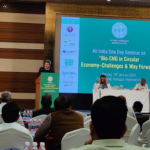Chhatrapati Sambhajinagar: In a move aimed at improving the health and welfare of women sugarcane workers and their young children, the Beed district administration has announced the introduction of ‘Arogya Mitra’—a new role that will serve as a bridge between migrant workers and government health services, reported PTI.
The initiative was confirmed on Tuesday by Beed Collector Vivek Johnson, who said the Arogya Mitra (meaning “health friend”) will be selected from among the women workers themselves. These women migrate from Beed to other districts in Maharashtra during the sugarcane cutting season, which runs from October or November through March or April.
“Since these labourers relocate for work, they lose contact with the local administration. As a result, their health concerns—especially those of women and children under five—often go unnoticed,” Johnson said. “The Arogya Mitra will help address this by staying in touch with ASHA and Anganwadi workers in Beed and communicating any health-related issues they face while working in other districts.”
The appointed women will receive training and will serve as local contact points to alert the administration about medical or health problems faced by the workers and their children. The number of Arogya Mitras to be appointed is still being finalised, with a survey currently underway. Training for the selected candidates is expected to begin in August.
According to a government survey conducted between August and October 2024, a total of 78,746 women left Beed to work in sugarcane fields in other districts. Of these, 34,151 were under the age of 30, and 1,523 were pregnant—135 of them with high-risk pregnancies. Additionally, 843 of these women had previously undergone uterus-related surgeries, though not just prior to the cutting season.
Officials say the Arogya Mitra program aims to ensure that such women and their children are not left without support while they are away from home, and that medical issues can be addressed in coordination with local health services in the regions where they work.
















